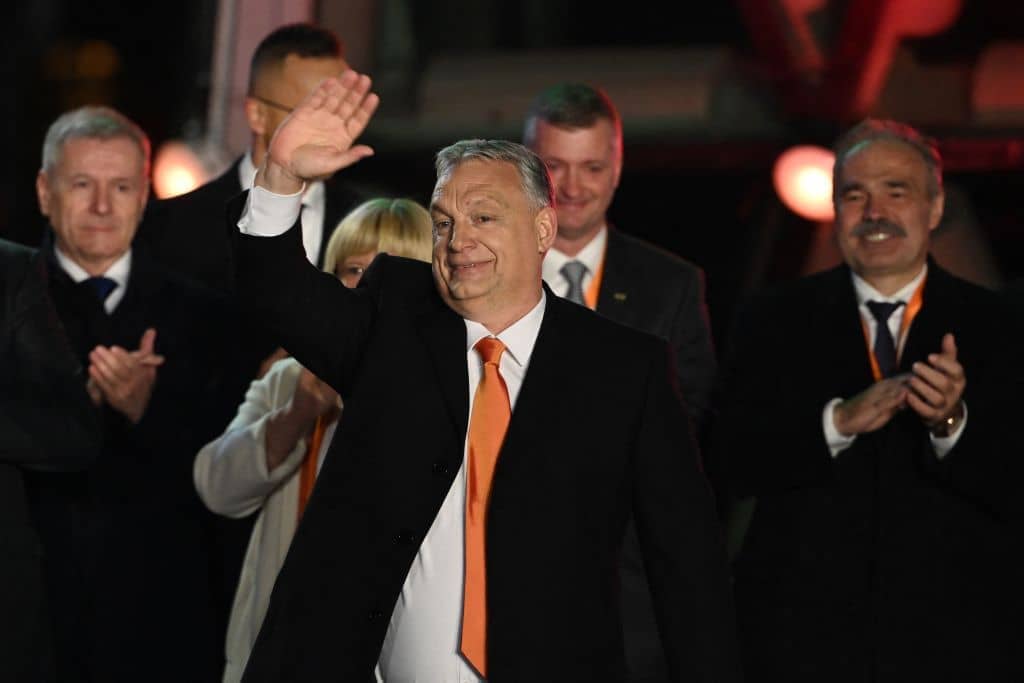Viktor Orbán took the stage for a victory speech in Budapest last night with supporters chanting his name. Not long after polling stations had shut, it was already clear that the Hungarian prime minister’s Fidesz party had won a stonking victory against the United Opposition, a group of six parties led by small-town mayor Péter Márki-Zay.
This morning, with 99 per cent of the votes counted, Fidesz has more than 53 per cent and the United Opposition has only 35 per cent – a much lower total than predicted. Surprisingly, the far-right party Our Homeland also gained enough votes to enter parliament. Fidesz won more votes than four years ago despite opposition attempts to defeat Orbán at all costs, in a coalition drawing together parties from socialists to former far-right fascists. Orbán will therefore likely retain his ‘supermajority’ of over two-thirds of the seats in the Hungarian parliament.
Cue wailing and gnashing of teeth in the international press. Some are already trying to invalidate Orbán’s victory by labelling him an ‘authoritarian leader’. Perhaps they should try telling this to the millions of people who voted for Orbán in Fidesz’s rural heartlands, and to the two districts of Budapest which may end up ‘orange’ this year. So there’s clearly something afoot in Hungary.
The opposition laid the groundwork for its defeat in the final weeks of its campaign
The opposition laid the groundwork for its defeat in the final weeks of its campaign, latching onto claims of gerrymandering and voter fraud as pre-emptive strikes to invalidate its impending loss. The gerrymandering complaint, which says a 2012 redrawing of the electoral map favours Fidesz, would have been a bone of contention if the total number of votes won by the two sides had been remotely similar – but they weren’t. And rage about how a first-past-the-post constituency system, accounting for just over half of the seats in parliament (the rest are allocated via proportional representation) leaves Fidesz with a disproportionately high share of MPs forgets that this is an inevitable result of first-past-the-post. The system favours Fidesz, as the party with the largest and most evenly distributed voter base, in much the same way as it did the Tories in Britain at the last election.
More concerning are allegations of voter fraud, with photos reportedly showing burnt bags of opposition postal votes from Hungarians in Romania sweeping through social media last week. The allegations will need to be investigated, although it should be remembered that Orbán opened up postal voting to ethnic Hungarians in Romania precisely because his long-time championing of their rights means most support him.
Instead of complaining that the game is unfair, perhaps the United Opposition should consider whether the fault for defeat lies with themselves. Coalition partners are already tearing each other to shreds, with the ire rapidly focusing on their leader, Márki-Zay. This is unfair: gaffe-prone he may be, but when I met Márki-Zay last year, I was also impressed by his eloquence and conviction.
As I wrote here in January, the opposition’s biggest problem always lay in the fact that it was united only by hatred for Orbán and presented no positive alternative vision for Hungary. Its only clear policy proposal was ‘loyal’ alignment with the EU in an attempt to ‘restore democracy.’ An inability to see any problems in a pro-democracy movement affirming that there was only one correct democratic choice was depressing to witness.
Yet in the closing weeks of the campaign, the opposition hit on its most disastrous campaigning ploy of all, portraying Orbán’s relative ambivalence over the Ukrainian conflict as evidence of his ‘Putinisation’ of Hungary. Orbán’s feet-dragging on Russian energy sanctions and refusal to send arms to Kyiv led to suggestions that Hungary under his rule is a pro-Kremlin ‘Trojan horse’ in the EU.
The tactic backfired because most Hungarian voters know that although Fidesz manipulates the press to its own ends, Hungary isn’t Russia. Opposition politicians bewail their impression that rural voters ‘only receive government propaganda,’ as though it’s not possible for anyone in Hungary with internet access to find various anti-Fidesz media outlets with a single click online. And Orbán clearly enjoyed the even-greater polarisation brought on by references to Russia and Ukraine, saying in his victory speech that ‘we have never faced so many opponents at the same time,’ listing Brussels bureaucrats, international media, ‘and the Ukrainian president too,’ after president Zelenskyy openly criticised his stance at a recent EU Council meeting.
Messianic messaging about ‘restoring democracy’ and turning away from Russia was a bad choice because Hungarians – like most central Europeans – don’t want to be saved by their politicians. Twentieth-century communism left people in this region deeply suspicious of utopian political ideals. Most don’t want a socialist utopia, or a utopia of ‘European values’: they want pragmatism, positivity, and respect for tradition. Fidesz offers these by the bucketload. The United Opposition offered confusion, negativity, and a desire to sacrifice traditional social policies on the altar of the EU liberalism that Orban defines himself against. As long as it continues to do so, Orbán will keep winning.







Comments